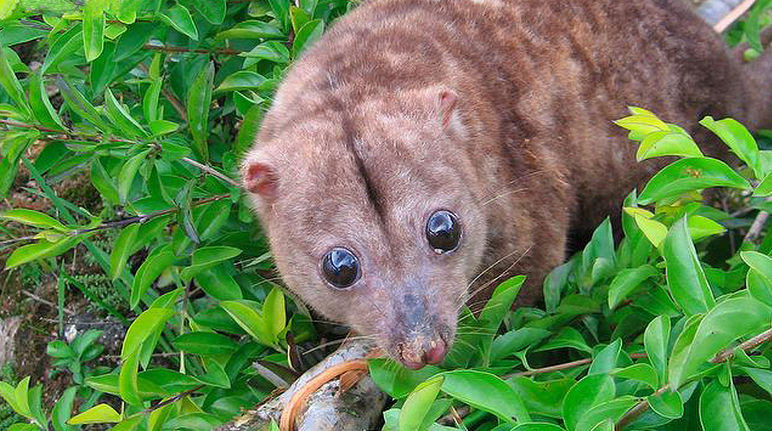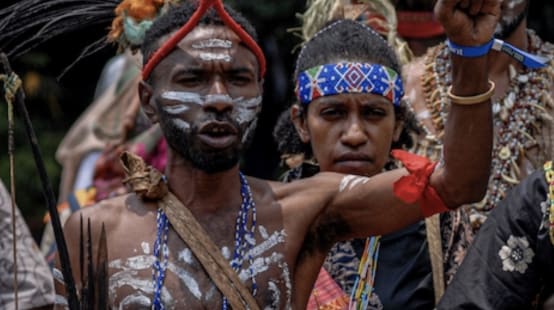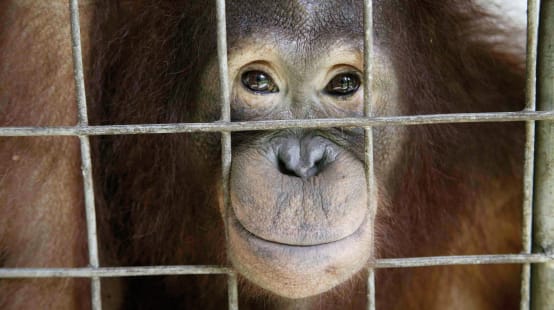Stop the deforestation of Woodlark Island!
 The Woodlark cuscus faces extinction if the island’s forests are cleared (© Eleanor Clapp)
The Woodlark cuscus faces extinction if the island’s forests are cleared (© Eleanor Clapp)
The Woodlark cuscus is a nocturnal marsupial that lives only on a remote island in Papua New Guinea. Its 6,000 inhabitants live in harmony with nature and have preserved the cuscus’s habitat. But now, a logging company has set its sights on 30,000 hectares of Woodlark’s forest. This could spell the end for the cuscus.
Call to actionTo: the Prime Minister of Papua New Guinea, James Marape, and the relevant authorities
“Woodlark is home to numerous endemic species such as the cuscus. Stop foreign companies from destroying the island’s rainforest.”
The destruction of Woodlark’s forests would be a crime against nature. More than 40 plant and animal species that occur nowhere else on Earth would lose their habitat: frogs, reptiles, insects, snails and the Woodlark cuscus, a nocturnal marsupial. Scientists anticipate that numerous yet-unknown species are at home on Woodlark, an island 270 km from the main island that has never been systematically studied.
Time and again, foreign companies set their sights on the island: Kulawood, a logging company, is currently pushing a project that reeks of corruption.
According to PNGi, Kulawood wants to clear 30,000 hectares of forest and sell 840,000 cubic meters of timber valued at US $87 million.
The logging operation appears to have begun: satellite images show that deforestation increased as of mid-2019, and that roads are being extended into largely uninhabited areas.
The logging is being camouflaged as an agricultural project that supposedly will involve planting cocoa bushes, rubber trees and acacias.
There was virtually no consultation of local people during the planning of the project, with the logging company leaving them in the dark about the extent of the clearing and its impact on their lives.
The project follows a pattern that those familiar with the workings of Papua New Guinea believe is widespread: Investors pose as local companies, gain access to land with promises such as commitments to develop agriculture – and in the end, plunder the forests and other natural resources.
On their own, the 6,000 inhabitants of the island do not have the resources to defend themselves against the destruction of their home. Please sign our petition and help them preserve this little slice of paradise.
Background“A biological jewel”, “jam-packed with unique species”, “biologically and culturally unique” – scientists marvel at the riches of Woodlark’s nature. Seven species of frogs can be found only on this island of Papua New Guinea and nowhere else in the world. The same is true of 19 snail, four reptile, seven plant and four insect species – two of which have not yet been given a scientific name. Researchers have captured several species of frogs and snakes and have yet to determine whether they are also endemic.
“Certainly there will be more undiscovered species on the island,” said Fred Kraus of the University of Michigan. The island is filled with secrets that have not yet been systematically explored. “Any large tract of forest in the New Guinea region is unique and probably harbors hundreds of specialized and perhaps endemic species—mainly of invertebrates and lesser vertebrates,” explains ornithologist Bruce Beehler.
Indigenous people living in harmony with nature
Woodlark’s indigenous people have lived in harmony with nature for thousands of years. “There remains on the island something of a unique example of a regional social and ecological system that supported human and other life for 2,000 and more years,” says anthropologist Frederick H. Damon, who spent more than 30 years studying the culture on the island.
For generations, the indigenous people have used the island’s nature in a sustainable manner by planting gardens, raising pigs and hunting. According to Global Forest Watch, they felled around 1,437 hectares of forest – corresponding to 1.7 percent of the island – between 2000 and 2012. If the 287 hectares on which new forest grew during this period are taken into account, the figure is only 1.3 percent.
Anti-corruption authority alerted
Companies have repeatedly tried to exploit Woodlark’s nature. In 2008, a palm oil company targeted the island, followed in 2014 by Karridale – a timber company that went to great lengths to hide the identity of its owners – then the mining companies Kula Gold and Geopacific. Now, Kulawood wants to log 30,000 hectares of forest.
PNGi investigated the Kulawood case in detail and July 5, 2018, sent this letter to the Forest Administration and the Anti-Corruption Authority.
Background information
http://news.mongabay.com/2014/0428-hance-woodlark-logging.html
http://news.mongabay.com/2014/0922-hance-woodlark-island-logging-endemics.html
http://news.mongabay.com/2014/1021-hance-alert-woodlark.html
Cuscus on the Red List: http://www.iucnredlist.org/details/16846/0
To: the Prime Minister of Papua New Guinea, James Marape, and the relevant authorities
Dear Prime Minister Marape,
Ladies and Gentlemen,
The 6,000 inhabitants of Woodlark live in harmony with the ancient forests of their island home. Those forests provide habitat for at least 42 endemic species, including the Woodlark cuscus. Scientists are confident that many more species still await discovery on the island.
Nevertheless, Kulawood and other foreign companies such as Karridale, Kula Gold and Geopacific have repeatedly initiated logging, mining and agricultural projects that would destroy thousands of hectares of forest and violate the rights of the island’s people.
We therefore call on you to put a stop to such projects and to not grant any logging permits for Woodlark.
Sincerely,













 Recent successes
Recent successes